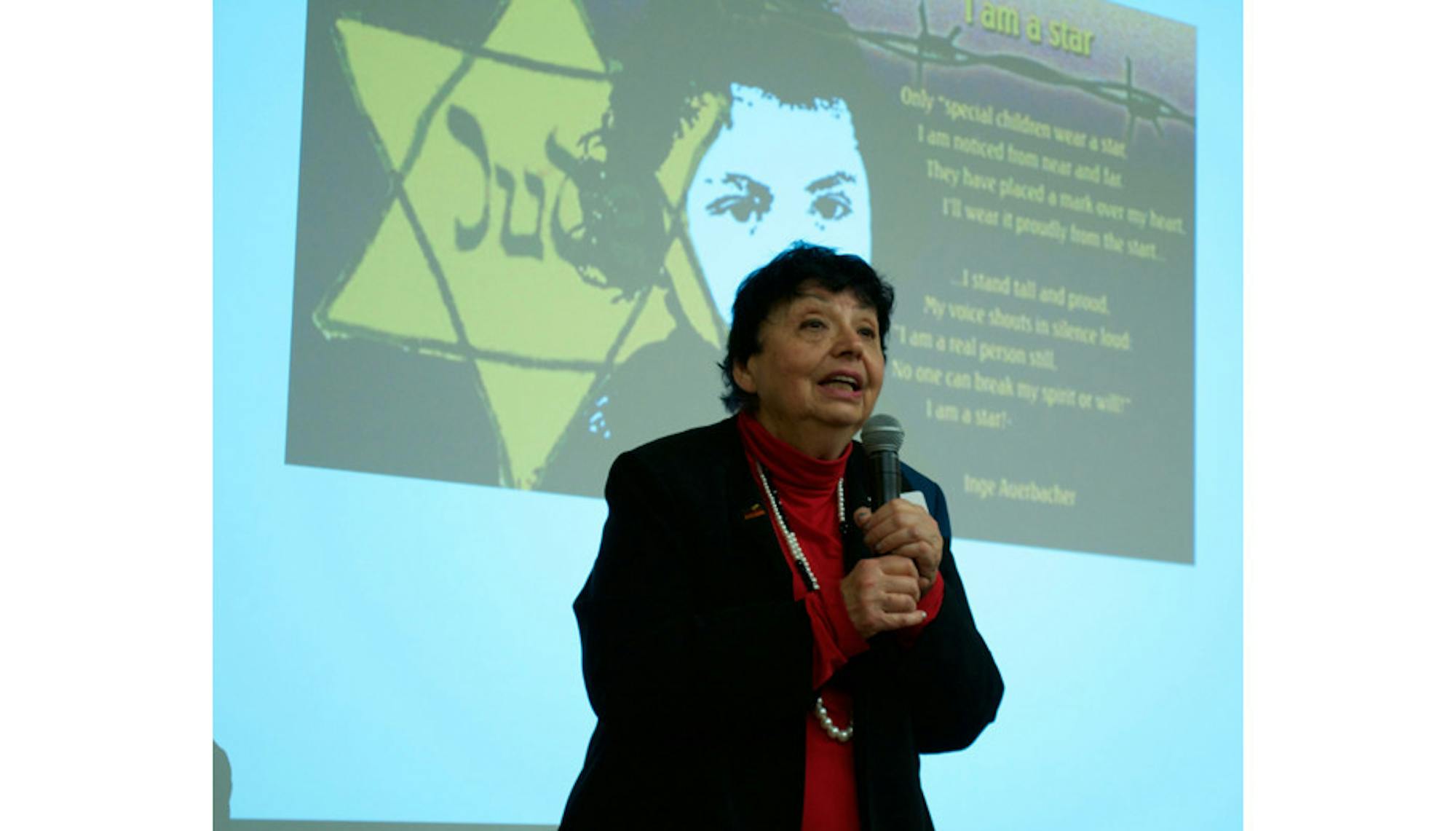Holocaust survivor Inge Auerbacher spoke to an audience of approximately 200 people about her experience living through the Holocaust in her keynote address for the Cummings/Hillel Program for Holocaust and Genocide Education on Wednesday night in the ASEAN Auditorium.
Shoshana Weiner, one of two Cummings/Hillel interns for Holocaust and Genocide Education, opened the event and was followed by Rabbi Jeffrey Summit, the Neubauer Executive Director of Tufts Hillel, who introduced Auerbacher.
The auditorium laughed when Auerbacher asked that no one call her old as she began speaking.
“I’m 81 years young,” she said, before delving into her childhood experience of being deported to the Terezin concentration camp in Czechoslovakia at the age of seven, where she remained until the camp was liberated by the Red Army on May 8, 1945.
Auerbacher explained that she was born on Dec. 31, 1934 in Kippenheim, Germany. There were no hospitals in Kippenheim at the time, so she was delivered in her parents’ bedroom by a doctor who belonged to the Nazi party. Auerbacher said the doctor treated her family very well and that she could say nothing ill of him because he was the person who gave her the gift of life.
On Nov. 9, 1938, everything changed for Auerbacher’s family, she said. On Kristallnacht, or "The Night of Broken Glass," Jews across Germany were attacked in coordinated riots. All of the windows in Auerbacher’s house were shattered, and shards of glass covered the floor.
The next day, Auerbacher’s grandfather went to their synagogue to say his morning prayers, and in the midst of this spiritual act, he was violently arrested. Auerbacher’s father was also arrested, and they were both sent to the Dachau concentration camp. She explained that they were treated horribly at Dachau, forced to stand at attention outside in the frigid air. Fortunately, they were released after a few weeks, she said.
In 1939, Auerbacher’s family moved to Jebenhausen, Germany to live with her grandparents. She said that her grandfather soon passed away from a heart attack caused by residual emotional and physical stress from Dachau. Two years later, deportations escalated, and Auerbacher’s grandmother was deported to Riga, Latvia, where she was shot and buried in a mass grave.
In August 1942, Auerbacher and her parents were deported to Terezin. Auerbacher was the youngest of the 1,200 people who were transported.
At this point in her story, Auerbacher showed the audience photographs of Jewish people being deported during the Holocaust. She pointed out the groups of people who stood in the streets and watched their neighbors being taken away. Auerbacher condemned these bystanders, saying that they did nothing to stop the horrors that were taking place right before their eyes.
There were very few happy moments in Auerbacher’s life during the three years that she spent at Terezin, she said. Prisoners at Terezin lived among mice, rats, fleas and bed bugs. She recalled that they were only allowed one or two showers per year with the permission of the camp guards, and many people perished from typhus contracted from contaminated well water. Auerbacher said she remembers seeing her first dead body at age seven.
She also remembers the ever-present hunger that she felt at Terezin. The prisoners were fed small, meager meals, she said. Turnips were the only vegetable that Auerbacher saw within the walls of the camp.
Auerbacher said that another little girl who suffered from tuberculosis was allowed to have an extra piece of bread with her meals, and she recalled praying that she would catch the same disease as this girl just to acquire extra food.
Those who did not perish from malnutrition or disease at Terezin were sent to their deaths in the gas chambers of Auschwitz. Ruth, Auerbacher’s best friend at Terezin, died at Auschwitz just before her 10th birthday. Auerbacher said that she is still greatly affected by this tragedy. In her speech, she shared a poem that she wrote about the final moments of Ruth’s life, titled “Hold Me Tight.”
Ruth was one of many children who perished in the Holocaust. In fact, of the 15,000 children who were imprisoned at Terezin, Auerbacher is a part of the mere 1 percent that survived.
After being freed, Auerbacher’s family moved to the United States, she said. She soon fell ill with tuberculosis and spent two years in bed-rest.Auerbacher was near death when the drug Streptomycin was developed, which saved her life. At age 15, she said, she was finally able to begin pursuing her education. Despite all of her setbacks, Auerbacher said that she forged a path as a medical researcher and clinician.
Auerbacher concluded by discussing her current life in Jamaica, Queens, where she is neighbors with a family of Hindus, a family of Muslims and a family of Christians. She explained that the families are all great friends and that she believes that her neighborhood is proof that people of all religions should be able to harmoniously coexist in the world.
Dr. Inge Auerbacher recounts experience surviving Holocaust

On April 20, in Cohen Auditorium, Inge Auerbach talks about her life during the Holocaust and the three years she spent in a concentration camp.





